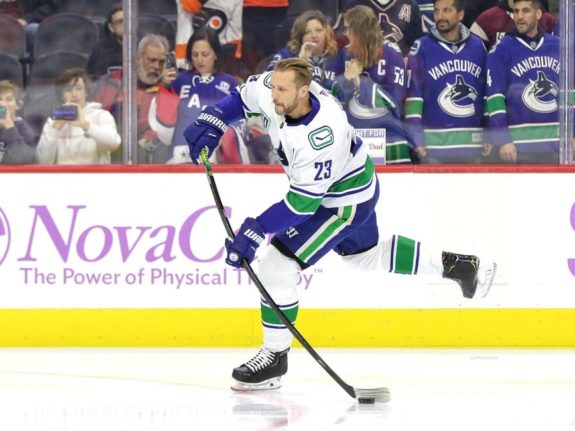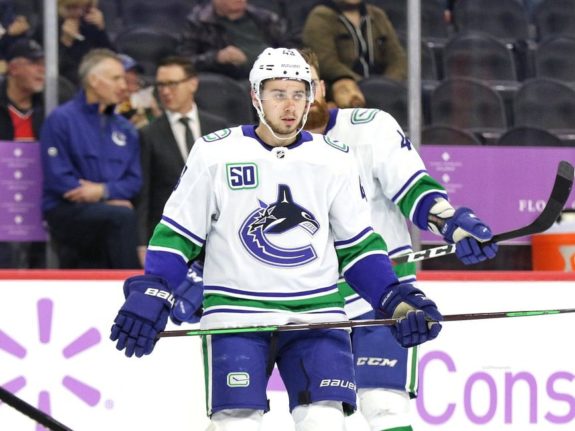Elias Pettersson and Quinn Hughes have made it obvious that they will become the cornerstones for the Vancouver Canucks for years to come. The two have impressed in their short careers but still have a lot more to give. With their amazing potential, general manager Jim Benning needs to sign both of them soon.
Contract Situation
The Canucks drafted Pettersson with the fifth-overall pick in the 2017 NHL draft. Just under a year later, the Swede signed a three-year, entry-level contract. The Canucks got more than they paid for out of Pettersson in his first two seasons of his entry-level contract. He’s had two 66-point seasons, which is just the tip of the iceberg for the budding superstar. He has one year remaining on that contract.

Hughes is in the same situation as Petterson. The seventh-overall pick from the 2018 NHL draft has been very impressive and has a chance to win the Calder Trophy like his teammate did last season. Although Hughes was drafted a season after Pettersson, his contract has one season left. He signed his entry-level contract with the Canucks last season when the team had 13 games remaining. Since he turned 20 years old in 2019, he burned the first season of his contract after playing his first game. The two cornerstones will become restricted free agents after the 2020-21 season.
Related: Canucks’ Top 5 Agitators of All-Time
The only difference between the two is Pettersson can be offer sheeted while Hughes cannot. Since Pettersson signed his contract at the age of 19 and has played three seasons in the NHL, he is eligible to receive an offer sheet from other teams in the league. Hughes has less than three years of experience, which means he is a 10.2 (c) player and can only negotiate with the Canucks.
Canucks’ Cap Situation
After the 2020-21 season, the Canucks have a few other big contracts that will expire, including Brandon Sutter ($4.375 million), Tanner Pearson ($3.750 million), Alex Edler ($6 million) and Jordie Benn ($2 million). Sutter will not be signed, at least not at the same price point. Edler is in a similar position, as he will be 36 years old at that time. If the team does decide to re-sign the long-time Canuck, it will be for a cheaper deal than he is signed to now. Pearson may get traded in the offseason to free up some cap space for the upcoming free agents.

The team is tight on cap space this season and has a few decisions to make. They have to re-sign their season MVP in Jacob Markstrom and they have to make a decision on re-signing Tyler Toffoli after trading a lot for him. They also have to decide on Chris Tanev, Troy Stetcher, Jake Virtanen and Adam Gaudette, and will have a projected $39.416 million projected cap space heading into the 2020-21 offseason.
Contract Comparables
Elias Pettersson
The first-line centre is averaging .95 points per game throughout his first two seasons in the NHL, which is second only to Connor McDavid for players in their first two seasons over the past decade. McDavid’s point-per-game rate was 1.17 in his first two seasons, which earned him a $12.5 million per season over eight seasons. His point-per-game rate is quite higher than Pettersson’s.

A better comparison for Pettersson is Auston Matthews, who averaged .92 points per game throughout his first two seasons. Halfway through the 2018-19 season, the Toronto Maple Leafs rewarded Matthews a five-year, $11.634 million per season contract. He was in his third season and was in the midst of a 94-point season.
Related: Mark Stone’s Top 5 Expressions
Pettersson finished with 66 points in 68 games and will likely have an offensive explosion similar to the Maple Leaf’s centreman next season. If that does happen, Canucks could end up paying the forward around $11 million over the next five seasons.
Quinn Hughes
Hughes has the most points for a rookie defender in a season since the 2008-09 season. It is tough to find a fair contract comparison for Hughes aside from Cale Maker since both are still on their entry-level contract. Therefore, it makes sense to look at other veteran defensemen across the league. The Canucks’ rookie defenseman was fifth in points for a defenseman this season with 53. Last season, Jacob Trouba had 50 points in 82 games, which earned him a $56 million contract over seven years.

Trouba was 25 at the time he signed his contract, five years older than Hughes. His $8 million over seven seasons is at the lower end of what the Canucks can offer their rookie defenseman in his extension. Drew Doughty is another comparison for what the rookie can receive. Doughty is a completely different defenseman than Hughes but he earned his $11 million over eight years after his 60-point season in 2017-18. That is the higher end of what the Canucks can offer him.
Projected Contracts for Both
Offering the two a contract now could help the Canucks get a cheaper deal, especially with both of them rapidly developing into better players. If the Canucks sign Pettersson this offseason, they can get him on a deal that is somewhat cheaper than the one the Maple Leaf’s gave to Matthews. Based on his point-per-game production in his first two seasons, a $10.5 million deal over five seasons would be fair. If the team waits for the final season to play out, Pettersson will likely have a breakout season and earn a contract north of $11.634 million.

As for Hughes, a contract between $8 million to $11 million is likely with similar terms to Pettersson. The Canucks could offer both their cornerstone players identical deals like the Chicago Blackhawks had done with Jonathan Toews and Patrick Kane. Offering both $10.5 million per season for five seasons is a possibility. The two would help out the Canucks a lot by taking a deal cheaper than the one suggested. This may be likely if the two value winning more than getting paid.